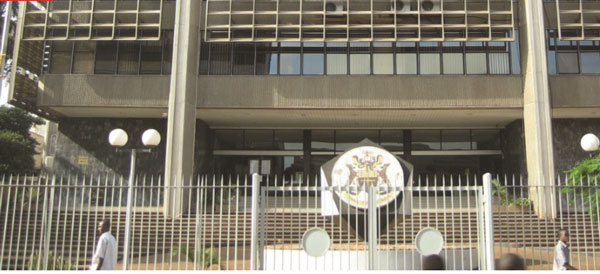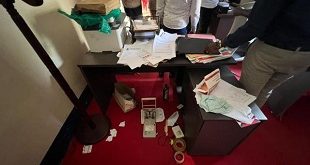
Kampala, Uganda | THE INDEPENDENT | Bank of Uganda has expressed disappointment with the company contracted to print Ugandan currency over failure to transport cargo on agreed terms.
The letters, which reveal the actual agreements between the Central Bank and Oberthur Fiduciare, the company that printed money, indicate that the major conflict is on the transportation, not printing.
BOU shipped into the country 70 million banknote pieces of 5,000 bill denomination on April 27, 2019.
On inspecting the plane at Entebbe International Airport, there was extra cargo which was not supposed to be there. This has descended into a full-blown scandal with many Ugandans suspecting extra money could have been printed without authorization.
Now the letters, which URN has seen, give a glimpse of what transpire exactly.
The letters also indicate that BOU officials who inspected the cargo and plane before shipping money were informed of one extra cargo but didn’t object to it.
On May 2, 2019, Dr. Nabatamba Bazizi, acting director currency department, wrote to Christopher Montent, commercial director of Oberthur Fiduciare tasking him to explain the contract breach.
She wrote: “Reference is made to your letter dated March 22, 2019, notifying the Bank [of Uganda] about different options, types and indicative prices for each of them for the delivery of 70 million banknote pieces of printed matter.”
She added: “The letter highlighted that the flight type was full charter; however, during the inspection of the cargo in the plane, the team noted that 5 out of the total 25 pallets had items that didn’t belong to Bank of Uganda as per the fixed labels.”
“This contravened the freight terms of full charter and, presented a high risk to the central bank of Uganda,” Bazizi wrote. “The purpose of this letter, therefore, is to request you to justify the contract breach, given the risks associated with this kind of action.”
In response, Montent wrote that BOU officials had been informed of only one extra pallet on-board. He said the remaining four were put by the cargo company without their knowledge.
“BOU representatives were informed about 1 raw material pallet. [For] the other four pallets, the cargo company, Network Airline Management Ltd, did not inform us and have presented their apologies in writing,” Montent wrote.
The company apologized and offered to compensate BOU or offer 10% discount on the upcoming shipment of the 10,000 notes.
“We would like to compensate Bank of Uganda for the misinformation regarding the 4 pallets and the inconvenience caused. Would you please tell us whether you prefer a 10% discount on the coming delivery of the UGX 10,000 notes or 15,000USD off your invoice to pay for the Shs 5,000?” Montent wrote.
It is not clear whether BOU has taken the decision to accept the offer. On Friday, two BOU employees who were informed of the extra 1 raw material pallet but did not object were charged at the anti-corruption court.
For the company that carried the money, it says it put extra cargo on the plane because it wanted to cover for the loss that came with using the bigger plane other than the one that had been chartered which was found to have a fault and thus could not fly to Uganda.
This was Network Airline Management Ltd, whose airplanes carried the money to Uganda.
Its chief commercial director Sam Lindsey wrote to BOU on May 2, 2019, of their decision to change the aircraft.
“In addition to the printed matter, there were some spare parts for unserviceable MD-11F and some general cargo loaded onboard to mitigate the losses of operating the B747F on this routing,” Lindsey wrote.
She added: “Please accept our apologies that this was not declared when the change of aircraft was made. We fully appreciate and understand importance and security required when carrying such cargo and apologize for the inconvenience cause.”
BOU cargo was supposed to be aboard the MD-11F aircraft charter flight AJK4042/LGG-EBB/26th April 2019.
The company says it took the decision to utilize our B747-400BCF to operate on the schedule.
In another internal letter to the legal department on May 2, 2019, Dr Bazizi informs BOU legal department of the anomaly and asked for the next course of action. This is when the governor decided to call in the help of the State house anti-corruption unit.
Bazizi revealed that the contract between BOU and M/s Oberthur Fiduciare was entered into in July 26, 2018. The company was to reprint 170million pieces and 130 million pieces of 5,000 and 10,000 shillings denomination bank notes respectively.
“Section 5.4 of the contract requires that the supplier identify at least two reputable carriers and insurers and advise the Bank of the related terms and costs,” Bazizi’s revealed.
On Tuesday last week, Mary Katarikawe, the BOU director of operations, told reporters the central wants to know how the extra cargo came to be on a full charter plane. She said they expected a report from State House Anti-Corruption Unit.
*****
URN
 The Independent Uganda: You get the Truth we Pay the Price
The Independent Uganda: You get the Truth we Pay the Price



I have said repeatedly, that Uganda is a “conduit” for bad money. If this current money scandal did not involve big people in government, all the culprits would be in jail. But what do we see, a scandal that borders on the integrity of the national Bank and security of a country is reported to the governor and the governor chooses to report the case to a security agency ‘the state house anti corruption unit’ which is not sanctioned by an act of Parliament. The president orders that everything should be kept a secret. And we are soon holding elections? I mean, we aren’t fools? Should the first line of call for the governor be the anti corruption unit at statehouse? What happened to the “criminal investigation department” of the Uganda police?
2. Why does it have to be 20 voluminous pallets, only to hold 170m of 5,000notes and 130m of 10,000notes? This money could be transported “discretely” in one or two briefcases. The fact that there were twenty pallets, we could possibly be looking at a wrong figure, or, that the aim was not entirely for transporting the currency alone but that it was a premeditated move to have all that was finally on that particular cargo.
3. What was the overall cost of transporting the currency on a “fully charted” plane, considering the “face value” of the currency in question?
4. If the plane was “fully charted”, why is “Oberthur” only willing to make a compensation of 10%? That contract should be terminated forthwith, with full compensation in relation to damages. They completely failed in matters of due diligence.
5. All responsible offices concerning the procurement of currency at the BOU should resign failure of which they should be fired.